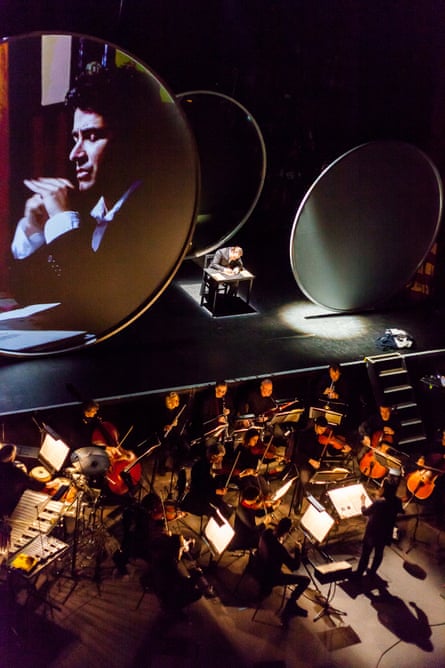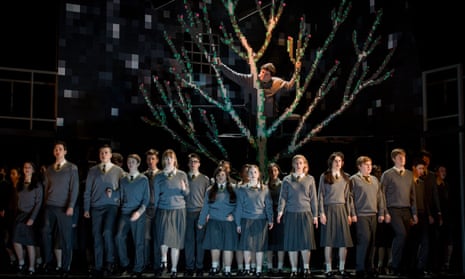Summer is over. School is back. Boasts and rivalries are alive and well in class 7D, who voice their objection to the trammels of uniform and homework in a sweet, neat, melodic chorus. This well-behaved opening gives no hint of the darkness to come in Nothing, a two-act opera, with music by David Bruce and words by Glyn Maxwell, given its world premiere on Thursday by Glyndebourne Youth Opera, for whom it was written. When the big boy in the corner, Pierre, suddenly blurts out that “nothing matters” and walks out, the impact is like gunshot. An offer to burn much-loved old toys, and then more precious and lurid items too, cannot coax their friend from the tree in which he sits staring at the sky. By Act 2, Bruce’s robust yet delicately woven score has turned sour and raw. Catastrophe engulfs them all like a great sink-hole splitting open in the playground.
Glyndebourne’s education department, celebrating its 30th anniversary this year, has been a pioneer in its creation of new work for teenagers, memorably Misper (1997) and Zoë (2000). This latest continues the tradition. Based on the novel by Janne Teller, it gives opportunity for many in the large cast (from two dozen local schools) to take small roles, and to work alongside fine young professionals (Marta Fontanals-Simmons, James Hall, Tristan Hambleton, Robyn Allegra Parton). Stuart Jackson sang Pierre with haunting, wistful coolness. The melismatic writing hinted at another outsider, Britten’s Peter Grimes, a role for which this tenor is surely destined. A few instrumentalists joined the excellent, flexible forces of the Southbank Sinfonia (special praise to harpist Daniel De-Fry).
Bruce’s score, full of tuneful anthems and ballads, also nods to ornate Renaissance traditions. Brilliantly drilled by the conductor, Sian Edwards, and the director, Bijan Sheibani, the entire company gave a highly professional and gripping performance. This is important for the audience, of course. More significant is the experience this gives all involved: not only the achievement, the camaraderie and the taste of opera, but giving, too, vital insight into mental health and crowd behaviour none will forget.
As the climax to a spring season entitled Figaro Forever, which opened with Rossini’s The Barber of Seville and Mozart’s The Marriage of Figaro, Welsh National Opera triumphed with a world premiere by the composer Elena Langer to a libretto by WNO’s artistic director David Pountney. This eclectic new work, Figaro Gets a Divorce – though he doesn’t quite – continues the double-knotted tale of the Count and Countess Almaviva, and the servants Figaro and his wife Susanna. Various sequels, including one by Beaumarchais, the original creator of these characters, have been attempted. Pountney’s is closest to the spirit of Ödön von Horváth’s 1936 play of the same title. Life has moved on, the characters are on the run – as Langer’s fast-moving kaleidoscopic score conveys – fleeing the revolution in grim circumstances and in thrall to a sinister double agent, the Major.
In his sharp text, Pountney has squeezed in every operatic trope, from cross-dressing to implied incest, to a character lost presumed dead but actually brazenly alive, wearing a blond wig and working in a sleazy bar (Cherubino the pageboy, now suggestively called Cherub and sung cherubically by Andrew Watts). There’s a love child, class warfare, rescue, madness and escape through the back of a wardrobe – that item of furniture so vital to the plot of Mozart’s opera. Figaro himself, tying up the loose ends with a nod to Rossini, is back with his straight-cut razor as the barber. Confounding expectation, the story tugs and tears at you with emotion: the very stuff of opera, without which all those clever scenarios would be a bore.

Conducted by Justin Brown, and played with flair by the WNO orchestra, Langer’s score answers the text with a potpourri of styles, snatches of arias and duets, and quixotic orchestral writing moodily coloured with accordion, piano and flexatone. Born in Moscow in 1974 but resident in Britain, Langer reveals powerfully Russian influences, stretching from the folk traditions explored by Rimsky-Korsakov and Stravinsky, to the brilliant jazz and cabaret pastiche in which Shostakovich so revelled, via mainstream European modernism and French sensuality. Out of this, Langer carves her own lively and engaging style and writes well for the human voice. She had an ideal cast. Each performed this new work with confident energy: Elizabeth Watts and Mark Stone as the Almavivas, Alan Oke as the Major, Naomi O’Connell as Serafin, David Stout as Figaro, Rhian Lois as Angelika. Marie Arnet, who sang Lulu for WNO, stole the show as the unexpectedly opportunistic Susanna. Special credit to Ralph Koltai, now 91, who has designed 250 productions over the past 66 years. He held all together in his versatile, clean-lined and atmospheric set.
The Coronet at Elephant and Castle in south London offered more new adventure. This cavernous art deco theatre, used more for club nights, generously embraced Michel van der Aa’s multidisciplinary extravaganza, The Book of Disquiet, given its UK premiere by the London Sinfonietta conducted by Joana Carneiro. The Dutch composer (born 1970) has consistently and ingeniously combined music, film-making and words – all under his direction – into single works of zest and beauty. The Book of Disquiet, first seen in Linz, Austria in 2009, is a 75-minute, precisely planned collision of film, electronics, amplified orchestra, surround sound and live narration from the actor Samuel West. West, delivering a meditation from the Portuguese author Fernando Pessoa’s The Book of Disquiet, is breathtakingly competent: the text is long, the requirement to fit with the music highly demanding. You understand what it’s about without having any anchor to the “plot”: loneliness and melancholy overlap with philosophy and cruel memories and dashed hopes.
It is hard, and perhaps wrong to try, to separate Van der Aa’s music from the whole experience: you come away with an aural image of long brass lines riding across lurching, urgent unison string figures. It’s only an impression. There’s so much more. At the end all is suddenly darkness. Stepping from this mesmerising interior fantasy into the roar of Elephant’s urban verismo is quite a wake-up call. Next in this Sinfonietta series at the Coronet: the UK premiere of Enno Poppe’s Speicher on 10 March.
Star ratings (out of 5)
Nothing *****
Figaro Gets a Divorce ****
The Book of Disquiet ****

Comments (…)
Sign in or create your Guardian account to join the discussion